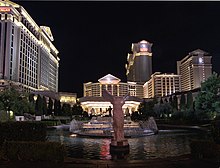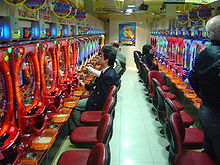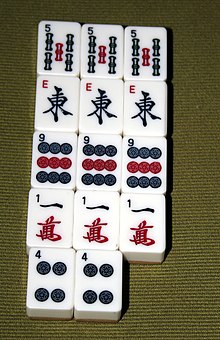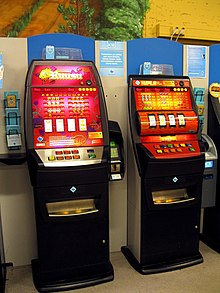
Games available in most casinos are commonly called casino games. In a casino game, the players gamble cash or casino chips on various possible random outcomes or combinations of outcomes. Casino games are also available in online casinos, where permitted by law. Casino games can also be played outside of casinos for entertainment purposes, like in parties or in school competitions, on machines that simulate gambling.
Spread betting is any of various types of wagering on the outcome of an event where the pay-off is based on the accuracy of the wager, rather than a simple "win or lose" outcome, such as fixed-odds betting or parimutuel betting.
Fixed-odds betting is a form of gambling where individuals place bets on the outcome of an event, such as sports matches or horse races, at predetermined odds. In fixed-odds betting, the odds are fixed and determined at the time of placing the bet. These odds reflect the likelihood of a particular outcome occurring. If the bettor's prediction is correct, they receive a payout based on the fixed odds. This means that the potential winnings are known at the time of placing the bet, regardless of any changes in the odds leading up to the event.

A bookmaker, bookie, or turf accountant is an organization or a person that accepts and pays out bets on sporting and other events at agreed-upon odds.
In probability theory, odds provide a measure of the likelihood of a particular outcome. When specific events are equally likely, odds are calculated as the ratio of the number of events that produce that outcome to the number that do not. Odds are commonly used in gambling and statistics.
Vigorish is the fee charged by a bookmaker for accepting a gambler's wager. In American English, it can also refer to the interest owed a loanshark in consideration for credit. The term came to English usage via Yiddish slang which was itself a loanword from Russian.
A betting strategy is a structured approach to gambling, in the attempt to produce a profit. To be successful, the system must change the house edge into a player advantage — which is impossible for pure games of probability with fixed odds, akin to a perpetual motion machine. Betting systems are often predicated on statistical analysis.
Sport Select is a group of sports betting games offered by Canada's lottery corporations. In Quebec, the program is known as Pari sportif; in Ontario and Atlantic Canada, it is known as Pro-Line while in British Columbia, it is known as Sports Action. However, the rules for the games are similar in all provinces. Initially created to offer betting primarily on the North American major professional sports leagues, Sport Select has expanded to offer betting on competitions such as the English Premier League and college sports.

Sports betting is the activity of predicting sports results and placing a wager on the outcome.

In the United States, a sportsbook or a race and sports book is a place where a gambler can wager on various sports competitions, including golf, football, basketball, baseball, ice hockey, soccer, horse racing, greyhound racing, boxing, and mixed martial arts. The method of betting varies with the sport and the type of game. In the US, the Professional and Amateur Sports Protection Act of 1992 allowed only Nevada, Oregon, Montana, and Delaware to legally wager on sports other than horse racing, greyhound racing, and jai alai; the law was ruled unconstitutional on May 14, 2018, freeing states to legalize sports betting at their discretion.
Gambling in the United Kingdom is regulated by the Gambling Commission on behalf of the government's Department for Digital, Culture, Media and Sport (DCMS) under the Gambling Act 2005. This Act of Parliament significantly updated the UK's gambling laws, including the introduction of a new structure of protections for children and vulnerable adults, as well as bringing the burgeoning Internet gaming sector within British regulation for the first time.
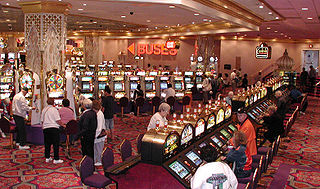
In the United States, gambling is subject to a variety of legal restrictions. In 2008, gambling activities generated gross revenues of $92.27 billion in the United States.
Asian handicap betting is a form of betting on football in which teams are handicapped according to their form so that a stronger team must win by more goals for a bet on them to win. The system originated in Indonesia and gained popularity in the early 21st century. It is a form of spread betting. Handicaps typically range from one-quarter goal to several goals, in increments of half- or even quarter-goals.
A parlay, accumulator, combo bet, or multi is a single bet that links together two or more individual wagers, usually seen in sports betting. Winning the parlay is dependent on all of those wagers winning together. If any of the bets in the parlay lose, the entire parlay loses. If any of the plays in the parlay ties, or "pushes", the parlay reverts to a lower number of wagers with the payout odds reducing accordingly. Parlay bets are high-risk, high-reward; linking the possibilities drastically reduces the chance of the bet paying off overall. The benefit of the parlay is that there are much higher pay-offs, although as usual, casinos and bookkeepers offering parlays often exploit the poor calculation of gamblers by not increasing the pay-out as much as the odds truly demand, with the effect of the house edge increasing in parlays.

A fixed odds betting terminal is a type of electronic slot machine normally found in betting shops in the United Kingdom and introduced in 1999. The terminals allow players to bet on the outcome of various games and events which have fixed odds, with the theoretical percentage return to player (RTP) displayed on the machine by law. Like all casino games, the "house" has a built-in advantage. Typically, slot machine FOBTs have an RTP of 90% to 94% depending on the chosen stake, and standard roulette FOBTs have a long-term average RTP of 97%.
A tipster is someone who regularly provides information (tips) on the likely outcomes of sporting events on internet sites or special betting places.
Gambling in India varies by state; states in India are entitled to formulate their own laws for gambling activities. Some states like Goa have legalised casinos. Common gambling activities like organized betting are restricted except for selective categories including lottery and horse racing.
Advantage gambling, or advantage play, refers to legal methods used to gain an advantage while gambling, in contrast to cheating. The term usually refers to house-banked casino games, but can also refer to games played against other players, such as poker. Someone who practices advantage gambling is often referred to as an advantage player, or AP. Unlike cheating, which is by definition illegal, advantage play exploits innate characteristics of a particular game to give the player an advantage relative to the house or other players. While not illegal, advantage play is often discouraged and some advantage players may be banned by certain casinos.

Gambling on papal elections has at least a 500-year history. Betting on 16th-century papal conclaves are among the first documented examples of gambling on election outcomes. During the same period, gambling was also common on the outcomes of secular Italian elections, such as that of the Doge of Venice.

Gambling in Italy has existed for centuries and has taken on many forms. Its dates back to the days of the Roman Empire, when the predecessor of the modern game of backgammon, Ludus Duodecim Scriptorum, became popular among Roman legionnaires. It is also due to them that the game came to other European countries.




